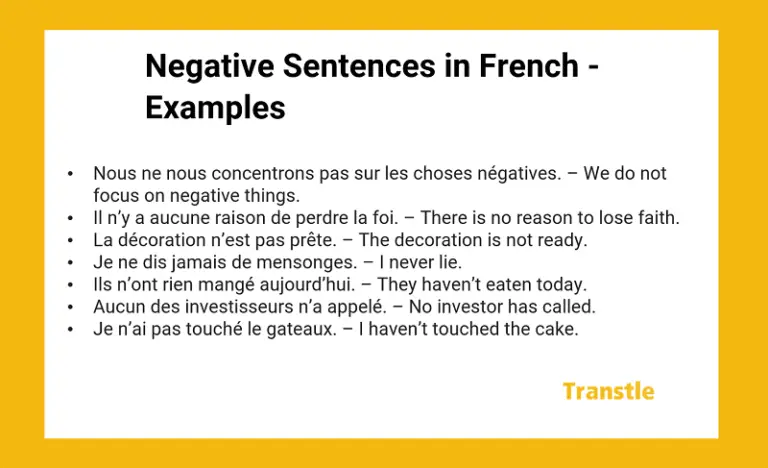Negative Sentences in French: How to deny in French
Forming negative sentences in French (or phrases négatives) is absolutely essential for everyday communication. It’s how you deny an action, state a non-occurrence, or simply say “no.”
This comprehensive guide will demystify French negation, from the fundamental ne…pas structure to more advanced negative expressions.
The Core of French Negation: Ne…Pas
The most common way to form a negative sentence in French is by using the two-part negation: ne…pas. Think of it as a “negation sandwich” that surrounds the verb.
The general rule is: ne + conjugated verb + pas
Important Note: The placement of ne…pas changes slightly depending on whether you’re using a simple tense (like the Present or Future Simple) or a compound tense (like the Passé Composé).
1. Negation in Simple Tenses
In simple tenses, ne…pas directly frames the single conjugated verb.
Formula: Subject + ne + Conjugated Verb + pas + complement
| French Example | English Translation | Breakdown |
|---|---|---|
| Je ne parle pas fort. | I don’t speak loudly. | Je + ne + parle + pas + fort |
| Tu ne manges pas de sucre. | You don’t eat sugar. | Tu + ne + manges + pas + de sucre |
| Elle n’est pas en colère. | She’s not angry. | Elle + n’ + est + pas + en colère |
In compound tenses (like the Passé Composé, Plus-que-parfait, etc.), ne…pas surrounds the auxiliary verb (usually avoir or être), not the main past participle.
Formula: Subject + ne + Auxiliary Verb + pas + Past Participle + Rest of Sentence
| French Example | English Translation | Breakdown |
|---|---|---|
| Je n’ai pas parlé fort. | I haven’t spoken loudly. | Je + n’ + ai + pas + parlé + fort |
| Tu n’es pas arrivé hier. | You didn’t arrive yesterday. | Tu + n’ + es + pas + arrivé + hier |
| Il n’a pas bu de café. | He hasn’t drunk coffee. | Il + n’ + a + pas + bu + de café |
Just like many other French words ending in ‘e’, the negative particle ne contracts to n’ before a word starting with a vowel or a silent ‘h’.
- Nous n’avons pas trouvé le chat. (We haven’t found the cat.)
- Ils n’ont pas de temps. (They don’t have time.)
- Il n’habite pas ici. (He doesn’t live here.)

Negative Sentences and Partitive Articles
This is a key rule for learners! When you make a sentence negative, partitive articles (du, de la, de l’, des) almost always change to de or d’ (before a vowel or silent ‘h’). This indicates “no” or “not any.”
To understand partitive articles better, check out this detailed guide on French articles.
| Affirmative Sentence | Negative Sentence |
|---|---|
| Je veux du pain. (I want bread.) | Je ne veux pas de pain. (I don’t want bread.) |
| Ils ont des pommes. (They have apples.) | Ils n’ont pas de pommes. (They don’t have apples.) |
| Vous mangez de la salade. (You eat salad.) | Vous ne mangez pas de salade. (You don’t eat salad.) |
Beyond Ne…Pas: Other Forms of Negation in French
While ne…pas is the most common, French offers several other negative expressions to convey different nuances. They all follow a similar structure: ne + verb + negative word.
Formula: Subject + ne + Conjugated Verb + Negation Word + Rest of Sentence
Here are the most common ones, with the second negative particle now highlighted in bold:
- Ne…Jamais (Never)
- Tu ne pleures jamais. (You never cry.)
- Il ne danse jamais. (He never dances.)
- Ne…Personne (Nobody / No one)
- Il n’y a personne ici. (There is nobody here.)
- Je ne connais personne qui veuille le faire. (I don’t know anyone who wants to do it.)
- (Note: “Personne” can act as a subject or object. When it’s the subject, “ne” still precedes the verb: Personne ne parle. – Nobody is speaking.)
- Ne…Rien (Nothing)
- Il n’y a rien à dire. (There is nothing to say.)
- Je ne dis rien. (I’m saying nothing.)
- (Note: “Rien” can also act as a subject: Rien ne bouge. – Nothing is moving.)
- Ne…Plus (No longer / Not anymore)
- Je ne veux plus de pizza. (I don’t want any more pizza.)
- Ils ne travaillent plus à l’école. (They don’t work at the school anymore.)
- Ne…Aucun / Aucune (No / Not any)
- Aucun agrees in gender with the noun it refers to. It is almost always used in the singular, meaning “not a single one.”
- Ils n’ont trouvé aucun avocat. (They haven’t found any lawyer / not a single lawyer.)
- Nous n’avons vu aucun chat. (We haven’t seen any cat / not a single cat.)
- Elle n’a aucune idée. (She has no idea.)
Comprehensive and deeper list French negative expressions.
Examples of Negative Sentences in French
Let’s reinforce your learning with more varied examples:
- Je n’ai vu personne arriver. (I haven’t seen anyone arrive.)
- Vous n’avez aucune raison d’être en retard. (You have no reason to be late.)
- Elle n’est pas en colère. (She’s not angry.)
- Le professeur ne voulait pas échouer à l’examen. (The teacher did not want to fail the exam.)
- Les animaux ne doivent pas vivre dans des cages. (Animals should not live in cages.)
- Les gens ne doivent pas partager leur vie privée sur les réseaux sociaux. (People should not share their private life on social networks.)
- Vous n’avez pas peur d’apprendre de nouvelles choses. (You are not afraid to learn new things.)